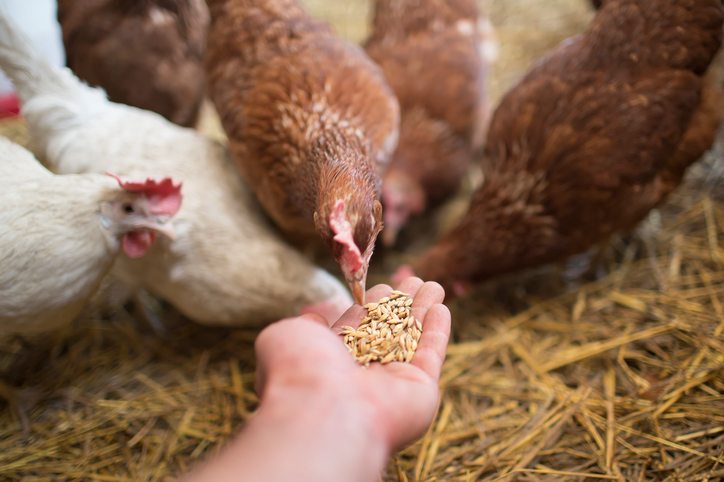Raising chickens can be a delightful and rewarding experience, but the costs of chicken feed can add up quickly. If you’re wondering how to save money on chicken feed, you’ve come to the right place. This comprehensive guide will offer big, approved strategies that can help you keep your poultry well-fed without breaking the bank.

Why Feed Costs Matter
The price of chicken feed is one of the largest expenses for poultry enthusiasts. Managing this cost effectively can make your poultry-raising experience even more delightful and financially rewarding.

Understanding Chicken Nutrition
Before diving into how to save on feed, it’s crucial to understand the nutritional needs of chickens. Your flock’s health is directly tied to what they eat, so ensuring they get quality nutrients while saving money is key.
Essential Nutrients
Chickens require a balanced diet that includes proteins, carbohydrates, fats, vitamins, and minerals. Proper nutrition ensures strong eggshells, healthy feathers, and overall well-being.

Homemade Feed Mixes
One way to save money is by making your own feed. Homemade feed can be tailored to your chickens’ needs while cutting costs.
Basic Homemade Feed Recipe
Combine ingredients like maize, oats, fish meal, and vegetable scraps to create a nutritious and cost-effective mix.

Buying in Bulk
Purchasing feed in bulk is a straightforward way to reduce costs. Many feed stores offer discounts on larger quantities.
Storage Tips
Store bulk feed in a cool, dry place in airtight containers to maintain its quality and prevent spoilage.
Utilizing Food Scraps
Many household food scraps are suitable for chicken feed. This not only reduces waste but also cuts down on commercial feed expenses.
Safe Food Scraps for Chickens
Examples include vegetable peels, fruit scraps (avoid citrus), and cooked grains.
Free-Range and Pasturing
Allowing chickens to forage can significantly lower feed costs. Chickens naturally peck at insects, plants, and grains, which supplement their diet.
Benefits of Free-Range Chickens
Free-ranging not only saves money on feed but also keeps chickens physically and mentally active.
Seasonal Feeding Strategies
Adjusting feeding strategies according to the season can help in saving money. For instance, during summer, more greens and less commercial feed may be required.
Winter Feeding Tips
In winter, chickens need more energy to stay warm, so incorporate extra grains and seeds into their diet.
Culling Non-Productive Birds
While it can be tough, culling older or non-productive chickens helps in reducing feed expenses. Focus on maintaining a productive flock to ensure your feed costs yield high returns.
Buying Off-Brand or Generic Feed
Often, off-brand or generic feed is just as nutritious as branded options but at a lower cost. Always check for nutritional content before purchasing.
Comparing Brands
Compare the nutritional labels of different brands to ensure you’re getting the best value.
Using Supplements Wisely
Supplements can sometimes be expensive, but using them judiciously can actually save you money in the long run.
Essential Supplements
Consider natural supplements like apple cider vinegar, garlic, and probiotics for their numerous health benefits.
Monitoring Feed Waste
Feed waste is a common issue that contributes to higher costs. Monitoring and reducing feed waste can lead to significant savings.
Feeding Equipment
Using proper feeding equipment, like no-spill feeders, can help minimize waste.
Community Buying Groups
Joining or forming a community buying group can help you purchase feed in bulk at discounted rates. Sharing the costs among group members can make feed more affordable.
How to Start a Buying Group
Connect with other poultry enthusiasts in your area and negotiate bulk deals with local feed suppliers.
Exploring Alternative Feed Sources
Consider alternative feed sources like brewery grains, local grain mills, and food co-ops. These can often be more affordable than traditional commercial feed.
Brewery Grains
Many breweries offer spent grains at little to no cost, which can be used as a supplement in chicken feed.
External Resources
For more information on poultry health and feeding, visit this resource.
Internal Resources
Check out more on chicken breeds and care on our website:
Conclusion
By implementing these strategies on how to save money on chicken feed, you can enjoy a more cost-effective poultry-raising experience. Always remember to balance savings with nutritional needs to keep your flock healthy and productive.
FAQs
What household scraps are safe for chickens?
Vegetable peels, fruit scraps (except citrus), and cooked grains are generally safe.
How much can I save by making my own feed?
Homemade feed can reduce costs by up to 20-30% depending on the ingredients used.
What are the benefits of free-ranging chickens?
Free-ranging chickens can lower feed costs and improve their physical and mental health.
As an Amazon Associate, I earn from qualifying purchases.








